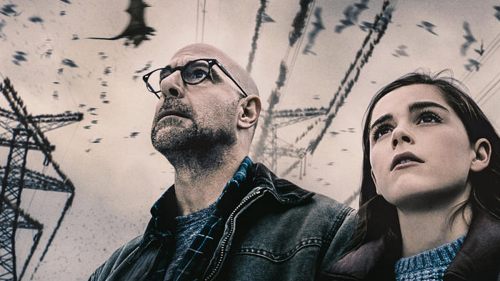Why New Horror Is Succeeding Where The Dark Universe Failed
A Quiet Place hits this week. Get your tickets here!
Horror movies have been in an excellent place over the last few years. The Witch, The Babadook, Don’t Breathe, Get Out, 10 Cloverfield Lane, and even last year’s IT comprise just a few of the movies that have come out recently; horror fans have had an embarrassment of riches to choose from, with numerous up-and-coming directors making their name off critical successes in the genre.
Yet you wouldn’t know this from looking at Universal. Universal’s attempt to get a horror-based cinematic universe going, self-titled the Dark Universe, has fallen on its face twice now, with not even the star power of Tom Cruise and Russell Crowe able to lift 2017's The Mummy to a level of success where a sequel would be warranted, let alone an entire cinematic franchise. With John Krasinski’s A Quiet Place making waves out of SXSW and poised to be the new horror hit, how are films like this succeeding where a major studio like Universal is failing?
The most glaring difference between the horror hits and the Dark Universe flops is the scope these movies employ. Looking at the successful horror films of the past few years, the most noticeable aspect of them is the relatively small number of characters. While it could be argued that this is a result of the undoubtedly limited budget these budding filmmakers have, it also allows for a narrower focus, practically ensuring greater audience investment.
Not only does the smaller scope effectively maintain the horror aspect of these films, it also separates them from standard superhero and action blockbusters. While the Universal movies have gone the “heroes save the world” route, the successful horror movies of the past few years have not been stories about a brave hero or group of heroes who need to fight a world-destroying threat, but rather a small group of ordinary individuals simply trying to survive against the threat of something they cannot explain.
This attention to character helps immensely. Both Universal’s Dracula Untold and The Mummy put their focus on the creatures themselves. The more successful movies of the genre, on the other hand, turned the focus squarely on the victims. Don’t Breathe focuses on Rocky, 10 Cloverfield Lane focuses on Michelle, The Babadook focuses on Amelia and Samuel, and so on. The common trait these characters share is that they’re all the targets of the monster, rather than the monster themselves. The 2017 version of The Mummy, by contrast, splits its focus between the titular creature and Tom Cruise’s Nick. To top it all off, it transforms Nick into the new version of the creature, making the movie less horror and more of an origin story for the Mummy, a tactic the Luke Evans-starring Dracula Untold also takes.
It also helps when limited explanation is afforded to the monster or the horror. Keeping in line with the movies’ trend of focusing on the targets, the monsters themselves are not over-explained. This not only allows the audience to more easily get into the mindset of the characters, it also gives the horror an air of menace and unpredictability that can only come from not knowing or understanding something fully. Focusing on the creature itself takes away that air of mystique, which is a crucial element of a good horror film.
Perhaps the most important aspect of well-received horror movies of the past few years has been their ability to create new horrors and new monsters to be afraid of. Black Philip and The Babadook were both original creations by Robert Eggers and Jennifer Kent, respectively, and even Pennywise, the creature terrorizing the town of Derry in IT, has only seen one prior onscreen interpretation. Universal, by comparison, worked with established creatures who have been interpreted numerous times, and which audiences likely have preconceived notions about when going into the film. A movie like It Follows, by comparison, does not suffer from the same kind of baggage. These movies also benefit from audience's unfamiliarity with the monsters by adding to the unpredictability of what they're capable of or what they might do, furthering the horror aspect.
All of this shows that there is a way to make an effective horror movie that audiences will respond to, and it's something many budding filmmakers have understood and been able to seize upon. A successful horror movie has nothing to do with a film's budget, and everything to do with how they execute the horror, starting with the focus of the story. If Universal is truly serious about their Dark Universe (and it doesn't look like they are anymore), they could do a lot worse than to look at what's made other horror movies of the past few years successful, and what made fans connect with them. 2017's IT proved that effective horror films can be made by big studios as well, and if the overall quality of horror films is elevated, everyone wins.



